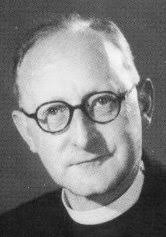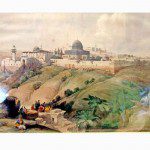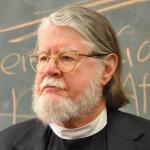 This month marks the release of a modern theological classic. Hendrickson Publishers has just issued E.L. Mascall’s Christ, the Christian and the Church. Some consider this one of the most insightful works of the modern era on Christology and the Church.
This month marks the release of a modern theological classic. Hendrickson Publishers has just issued E.L. Mascall’s Christ, the Christian and the Church. Some consider this one of the most insightful works of the modern era on Christology and the Church.
Who was Eric Mascall? Let me answer this question by quoting a few paragraphs from my Foreword to the book.
Eric Lionel Mascall (1905-93) was one of the best–perhaps the sharpest and most lucid–of orthodox Anglican theologians in the twentieth century. An Anglican priest who finished his career as Professor of Historical Theology at King’s College in the University of London, Mascall excelled in mathematics at the university, and boasted of never having been formally trained in graduate-level theology. These two facts might help explain why his theology was hailed for being so wide-ranging, incisive, and elegant.
Mascall wrote books in both philosophical and dogmatic theology. He was chosen to deliver two of Britain’s most prestigious lecture series, the Gifford and Bampton Lectures. The first was published as The Openness of Being (1971), and the second as Christian Theology and Natural Science (1956). The latter was celebrated by some as the best treatment to that day of the relationship between Christian faith and modern science.
The scope of Mascall’s writings was broad. He did serious work on the subjects of creation, epistemology, religious language, the Incarnation, the Trinity, the Church, ministry, and sacraments. He determined to converse with Protestants, Catholics, and Eastern Orthodox, and read their best theologians. His thinking displayed an oft-noted balance—between reason and revelation, the natural and the supernatural (nature and grace), philosophy and theology. Unlike some of his century’s theologians, he accepted the traditional theism of the Thomistic tradition, and rejected process and Hegelian thought. He believed in a properly Christian natural theology, but insisted that special revelation surpasses and controls what nature and reason show of God. He accepted the analogy of being, but did not believe that classical proofs could provide certainty. True faith, for Mascall, is a work of the Spirit that provides intuitive confirmation of what revelation declares. For this modest and gentle but humorous Anglican, the Christian life is a matter of daily liturgical prayer, participation in the sacraments–especially Eucharist–and gradual transformation by incorporation into Christ through his Church.
Christ, Christian and the Church (1946) is the closest thing we have to a Mascallian systematic theology. It is dedicated to the proposition that the center of Christian faith is the Incarnation. By baptism, he asserts, men and women are recreated through incorporation into the human nature of Jesus. Sanctification is the progressive realization in the moral realm of the change made in the ontological realm by baptism. Incorporation into Christ is incorporation into the Church, which is a living organism. The Church in its essence is simply the human nature of Christ. All the thought, prayer, and activity of Christians—insofar as they are brought into the sphere of redemption—are the acts of Christ himself in and through his Body. The thread that unites all these ideas for Mascall is the doctrine of the permanence of the manhood of the glorified and ascended Christ. This, he maintains, is the central principle of Christian theology.
Mascall’s balanced focus on the Incarnation eliminates the false binaries that bedevil so much of the Church today. In the treatise that follows, he shows that justification involves both imputation and impartation, that eschatology is both realized and futurist, that grace is offered universally and the Church is the only ark of salvation, that the Eucharist is both participation in the worship of heaven and the re-presentation of the once-for-all sacrifice of Calvary, that Christian faith must rest on both personal devotion and liturgical worship, that faith is not opposed to (orthodox) mysticism, and that revelation containing both propositions and mysterious images is compatible with rational (but not rationalistic) theology.











